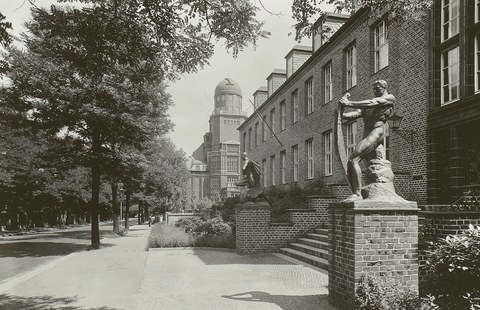Apr 19, 2023
TU Dresden investigates their own history

Street view of the 1939 building of the Institute of Automotive Engineering (today: Jante Building) with allegories on railroad and road traffic by Dresden artist Max Hermann Fritz (removed 1945), 1941.
An essay by Dr. Christine Ludl and Dr. Hagen Schönrich. They have been leading the research project and Research Training Group "Technische Hochschule Dresden in the 20th century" as scientific coordinators since January 2023.
The Royal Technical Educational Institute in Dresden was founded in May 1828. The almost 200-year history of Technische Universität Dresden developed from Brühl's Terrace - where the first lecture hall and two seminar rooms were housed in a small garden pavilion. In both the private and public spheres, birthdays and anniversaries traditionally provide an opportunity for a retrospective look at the "big picture," at what has been achieved so far, but also at the difficult times and critical moments. In recent decades, numerous institutes of higher education have used their anniversaries to intensively address their own past, away from "classic" anniversary publications that focus primarily on the positive. TU Dresden marked its 175th anniversary in 2003 with a comprehensive three-volume history showing the path of a critical university history. Since then, the focus has shifted further to a concentrated reappraisal of the National Socialist past in particular. On the occasion of its 200th birthday, TU Dresden is once again faced with the task of dealing intensively and without any restrictions or taboos with its own history.
Under the patronage of the Vice-Rectorate University Culture, several working groups consisting of professors from the Institute of History and representatives of the University Archives, the Office for Academic Heritage and the SLUB Dresden have been working on this topic for more than two years. The working groups drafted a detailed concept paper and discussed it with an international Advisory Scientific Council. A Research Training Group will be established later this year to further intensify the work: Up to ten doctoral students will conduct research in case studies on the role of individuals, disciplines and institutions of TH Dresden and contribute to a better understanding of the multi-layered interconnections of university, politics and society between the Weimar Republic, the Nazi dictatorship and the GDR.
For this purpose, the project examines the production, application and dissemination as well as the exclusion and forgetting of knowledge. The focus is on the interactions between scientific practice and the structures of power and domination in politics, economics and culture. The project examines the central question of the extent to which researchers, teachers, students and administrative staff at TH Dresden subordinated and adapted to the political and economic goals of National Socialism, and to what extent they used these for their own interests or if they attempted to resist the regime. The focus is on the National Socialist Germany period, but explicitly includes developments since the early 1920s and aftermaths until the late 1960s. What continuities, discontinuities and changes can be identified throughout that time?
The project is structured in three research areas: The research area " Networks of Knowledge" analyzes personal connections between university, economy, politics and society, which have enabled, influenced or prevented the production, use and dissemination of knowledge. The project uses methods of the Digital Humanities to determine the role of TH Dresden in national and international scientific networks and debates on the basis of the life and career paths of university members and the dissemination and reception of research topics. The working group " Applications of Knowledge" investigates in its projects how knowledge produced at TH Dresden was used during National Socialism. The foundation and development of technical universities in Germany is closely related to the demand of the state, industry and the military for scientific knowledge that can be used directly by them. Case studies, e.g. on chemistry or automotive engineering, will explore the development and application of knowledge relevant to armaments and war, and the extent to which they contributed to exclusion, war and extermination during National Socialism. At the same time, the project focuses on disciplines that, at first glance, only indirectly produce usable knowledge and that research has therefore long neglected. In Dresden, for example, this applies to teacher training and its contribution to a National Socialist educational policy. The research area "Places of Knowledge" investigates the function and significance of concrete places in the production and dissemination of scientific knowledge. Libraries, archives, collections and museums structured knowledge and regulated access - not only for researchers, but also for Dresden's urban society in particular. At the same time, popular science lectures and publications were also ways for the renegotiation of knowledge.
The dissertations promise to provide new and informative insights into the history of TH Dresden. In the course of the project phase, controversial topics, such as the naming of buildings and honors, will also have to be discussed again with the knowledge gained. The project poses the difficult question of the responsibility of science and scientists, of the contradictory and ever-challenging positioning in a network of diverse interests and under changing political and social conditions. How do we deal with this responsibility today as members of TU Dresden, but also as citizens of the city of Dresden? The Research Training Group will present its results not only in scientific publications, but also - supported by colleagues from the Directorate University Culture - in various commemorative activities, public lectures, exhibitions, a homepage and social media channels, and make them accessible to a broad public.
